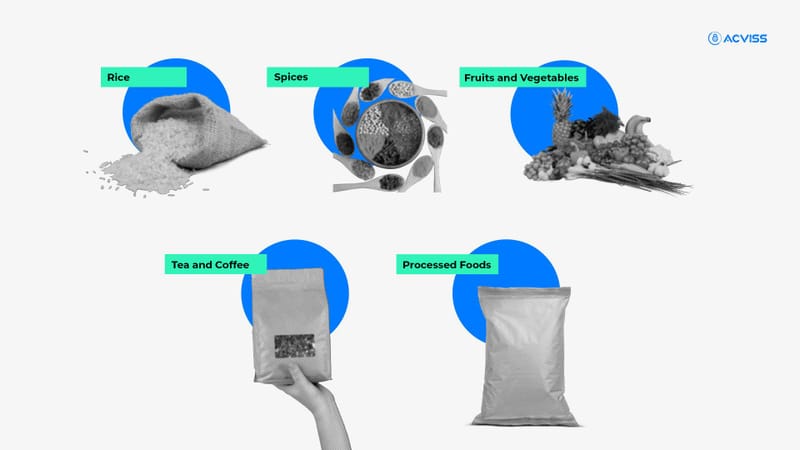Agro Product Exporters from India: A Growing Global Market

India has long been an agricultural powerhouse, with its rich soil and diverse climates supporting the production of various agro products. In recent years, Indian agro manufacturers have been making their mark globally, exporting goods to numerous countries across continents. With rising demand for Indian products and compliance with international standards, Indian agro exporters are tapping into a growing global market.
1. Top Agro Products Exported from India

Indian agro-product exporters are known for supplying a wide range of products that cater to different market needs around the world. From grains and spices to processed foods and organic products, India is a key supplier for many countries.
- Rice: India is the largest exporter of rice, particularly Basmati and non-Basmati varieties, catering to markets in the Middle East, Africa, and Europe. Major players like KRBL and LT Foods lead the export of this staple.
- Spices: Known as the "Land of Spices," India supplies more than 75% of the global spice demand. Products like turmeric, cumin, and black pepper are exported in bulk to the USA, Germany, and the UK.
- Fruits and Vegetables: Indian mangoes, bananas, and pomegranates are in high demand, particularly in the Middle East, Europe, and Southeast Asia. Companies like Kay Bee Exports are known for their high-quality produce.
- Tea and Coffee: India is one of the top exporters of tea, with major markets in the UK, Russia, and the UAE. Coffee, particularly from the states of Karnataka and Kerala, finds buyers in Europe and the US.
- Processed Foods: From ready-to-eat meals to snacks and spices, Indian processed food products are growing in popularity across North America and Europe, driven by the increasing Indian diaspora and the global trend toward convenience foods.
Impact: The export of these products strengthens India’s agricultural economy and enhances the country’s global trade relations.
2. Key Markets for Indian Agro Products

Indian agro manufacturers export to a diverse set of markets, with some regions showing a particularly strong demand for certain products.
- Middle East and Africa: The Middle East is a significant market for rice, fresh fruits, and spices. India’s geographic proximity and the shared cultural preferences for specific types of food make this a crucial region for agro exports. African countries are also key buyers of grains and pulses.
- Europe: The European Union has stringent quality standards, yet India remains a strong supplier of organic products, spices, tea, and coffee. Indian organic agro products, in particular, are gaining a foothold in this health-conscious market.
- North America: Indian agro exporters have seen growing demand in the US and Canada, particularly for spices, processed foods, and organic produce. The rising South Asian population in these countries has also driven demand for ethnic foods and ingredients from India.
- Asia-Pacific: Countries like China, Japan, and Southeast Asian nations import significant quantities of Indian rice, fruits, and vegetables. With rising disposable incomes in the region, demand for high-quality Indian produce continues to grow.
Impact: By catering to a wide range of global markets, Indian agro manufacturers are diversifying their revenue streams and increasing their influence on the global stage.
3. Challenges Faced by Indian Agro Exporters
While Indian agro exporters are making great strides, they face several challenges that can impede their global success.
- Compliance with International Standards: Different countries have strict regulations when it comes to food safety, quality, and packaging. Compliance with international standards such as ISO, HACCP, and Global G.A.P. can be difficult, particularly for smaller exporters.
- Supply Chain Disruptions: Ensuring the timely delivery of perishable goods, managing cold storage, and navigating complex logistics are ongoing challenges. Global events like the COVID-19 pandemic and the Russia-Ukraine war have also disrupted supply chains, causing delays and increased costs.
- Pricing Pressures: International buyers often seek the lowest possible prices, which puts pressure on Indian exporters to maintain competitive pricing while ensuring profitability. Fluctuating currency rates and rising input costs add to this challenge.
- Sustainability Demands: There is increasing global pressure for sustainable and eco-friendly farming practices. Agro exporters need to demonstrate compliance with environmental standards and certifications, such as organic and Fairtrade, to meet buyer expectations.
Impact: Overcoming these challenges is crucial for the sustained growth of Indian agro exports. Agro exporters are increasingly turning to innovative solutions to meet global standards and streamline operations.
4. How Indian Agro Exporters Are Complying with International Standards
To meet the stringent requirements of global markets, Indian agro exporters are investing in quality control, certifications, and sustainable practices.
- Certification and Traceability: Many exporters are adopting digital certification solutions like Acviss Certify to ensure their products meet international standards. These certifications help verify the authenticity and quality of products, ensuring they comply with regulatory requirements in different markets. Non-cloneable labels and digital traceability further strengthen product transparency, which is especially critical in markets like Europe and North America.
- Sustainable Farming Practices: Indian exporters are increasingly adopting sustainable farming methods to align with global expectations. Organic certification, eco-friendly packaging, and reducing carbon footprints through sustainable supply chains are becoming industry norms. This shift is not only driven by consumer demand but also by trade regulations that mandate sustainable practices.
- Advanced Supply Chain Management: Exporters are adopting track and trace solutions like Acviss Origin to ensure that products maintain quality from farm to fork. These technologies enable real-time visibility of shipments, ensuring that perishable goods are stored, transported, and delivered under optimal conditions, thus minimizing losses and maintaining product integrity.
Impact: By adopting these solutions, Indian exporters are positioning themselves as reliable suppliers in the global market, enhancing their reputation and ensuring long-term growth.
5. Success Stories of Indian Agro Brands in Global Markets

Several Indian agro exporters have successfully navigated the challenges of international trade and built strong global brands.
Amul's Dairy Success in Global Markets
Amul, one of India’s largest dairy cooperatives, has made a significant impact on global markets by exporting dairy products like butter, ghee, and milk powder to over 60 countries. By complying with international food safety standards and focusing on premium quality, Amul has become a trusted name in markets such as the Middle East, Southeast Asia, and Africa.
LT Foods Expanding India’s Rice Market
LT Foods, the maker of Daawat Basmati rice, is a major player in the global rice market, exporting to over 60 countries. The company has successfully met international standards, ensuring its products are certified by bodies like BRC Global Standards and FSSAI, making it a trusted supplier to markets in Europe, the Middle East, and the US.
Read more on Is QR Codes for Agro Exports Necessary or not?
Indian Agro Exporters in a Thriving Global Market
Indian agro exporters are well-positioned to capitalize on the growing global demand for high-quality, sustainable, and competitively priced agricultural products. Despite facing challenges like compliance with international standards and supply chain management, these exporters are finding success through innovation, technology, and sustainability.
Adopting cutting-edge solutions like Acviss Certify for digital product certification and for track-and-trace ensure the products meet the highest standards and reach global markets in the best possible condition. As these companies continue to evolve and adapt, the future of Indian agro exports looks promising.